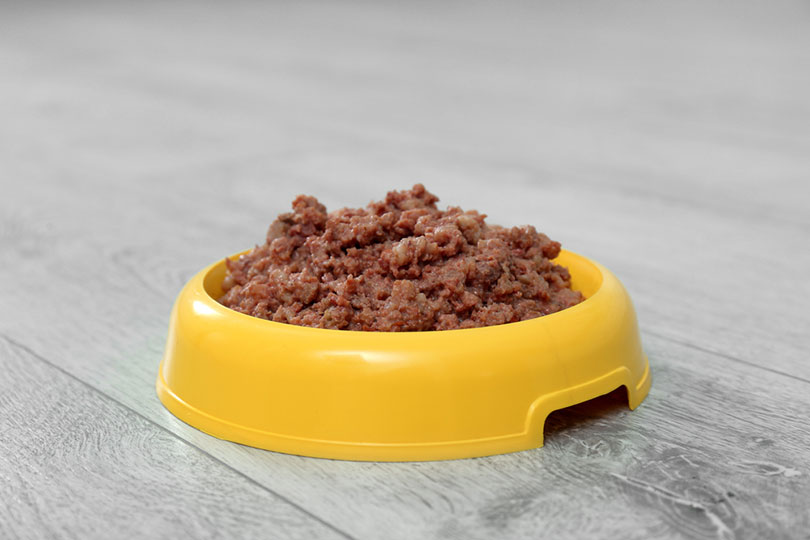
Feeding your dog a safe and healthy diet every day is an essential part of pet parenting and one many owners feel on a constant search for. New information is consistently being unveiled or discovered, with better or new ingredients being added or removed and medical science evolving. It’s creating a world where pet nutrition and diets are a forever changing and expanding industry.
Over the years as quality, standards, and choices of dog food have increased, so have pet parents’ expectations and awareness. A recent controversial nutrient called sodium selenite, a mineral found within dog food, has and still is causing much discussion among owners, experts, and dog food manufacturers.
What Is Sodium Selenite?
Sodium selenite is added as a supplement to commercial dog food. It is listed on the ingredient’s information as this name but sometimes may be bunched under the umbrella term “trace elements.”
Sodium selenite is an inorganic synthetic form of the natural mineral selenium. Selenium is an essential trace mineral required by dogs. Selenium is found in dairy, meat, fish, and whole grains. Due to the short shelf life of these products and how most of the natural selenium from animal sources is lost during the manufacturing process, the synthetic version (sodium selenite) is favored by dog manufacturers and, therefore, added as a supplement to the food.

Does My Dog Need Sodium Selenite?
Sodium selenite is an inexpensive, synthetic form of the natural essential trace mineral selenium. Minerals, much like vitamins, are a vital requirement of dogs, and they require selenium specifically to help maintain the normal functioning of their thyroid gland, to maintain immunity, for its function as an antioxidant and role in reproduction.
A deficiency in selenium can produce health problems, but due to reasons cited earlier—for example, the expense of selenium, the mineral often being lost in processing, and high doses of selenium found to be toxic—the alternative, sodium selenite, is predominantly used in very small amounts.
This is done because the essential mineral still needs to be supplied in their food; otherwise, deficiencies occur, which can cause health issues and certain conditions in your dog.
Signs Your Dog Is Deficient in Selenium
Signs of a clinical deficiency in selenium are very uncommon and rarely seen by veterinarians in recent times. Studies where both selenium and vitamin E were deficient in the diet of 5-8 week old Beagle puppies led to signs of muscle weakness, anorexia, depression, breathing difficulties and coma.
A long term lower level deficiency has been linked with various health concerns including the formation of urinary stones (calcium oxalate calculi), development of cancer, a reduction in a male dog’s fertility and slow recovery from parasitic diseases.

Signs of Selenium Toxicity
There are no known records of naturally occurring selenium poisonings in dogs. In studies, chronic selenium poisoning from food caused signs of anorexia, lack of growth, change in hair coat and hair loss, anaemia, a buildup of fluid in the abdomen and eventually death.
Potential Side Effects of Sodium Selenite
As with any excess of minerals or vitamins, toxic effects can be experienced by your dog if too much sodium selenite is consumed. It is this worry, along with the unnaturalness of the substance, causing some to be against the use of sodium selenite in dog food.
If sodium selenite is only consumed in the minute quantities as recommended by organizations such as The Association of American Feed Control Officers and the FDA, then there seems to be little evidence to suggest sodium selenite is dangerous for your dog or will produce any side effects.

Frequently Asked Questions (FAQs)
Are There Dog Foods Not Containing Sodium Selenite?
Yes, some dog foods and diets that do not contain sodium selenite are available. This is a conversation worth having with your veterinarian or veterinary nutritionist to determine if this is the best route for your dog before making your choice.
How Can I Check the Selenium Levels of My Dog?
Although not commonly performed, there are blood tests that veterinarians can use to check the levels of selenium in your dog’s serum (serum is a component of blood).
Can Selenium Help Prevent Cancer?
Yes, animal studies have found selenium is beneficial in the prevention of cancer and is particularly helpful in older canines. Please discuss this with your vet regarding if adding supplements to your dog’s diet or swapping your dog’s diet is the right decision for your dog.

Conclusion
Selenium or sodium selenite is a necessary mineral for your dog to consume in the correct quantities. Currently there is no evidence to suggest that sodium selenite, if kept within recommended guidelines, is harmful to dogs. It appears the controversy surrounding its safety is unfounded, although the long-term effects of this supplement have not been studied.
Reports found that sodium selenite is safe and effective to use in dogs. It is important to feed a balanced and complete diet to your dog to maintain their health and prevent nutritional deficiencies and health problems. Your discernment, backed with advice from your veterinarian, is the best way forward to deciding the correct diet and if supplements are needed for your dog.
Featured Image Credit: New Africa, Shutterstock
The post Sodium Selenite in Dog Food: Vet-Approved Nutrition Info appeared first on Pet Keen.



